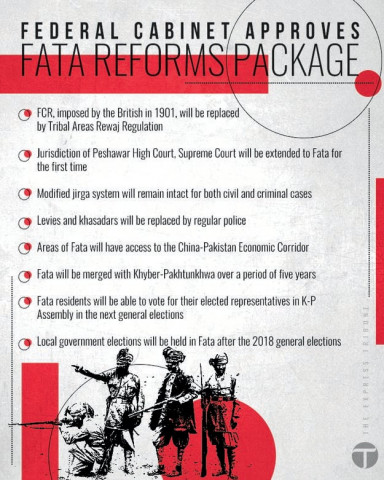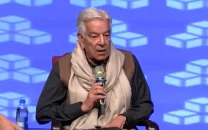K-P suggests seven amendments over FATA merger
Draft submitted to implementation committee on reforms

K-P suggests seven amendments over FATA merger
The provincial government had, on December 18, 2017, submitted a draft plan to the National Implementation Committee on Fata Reforms. While the draft has not been officially released, The Express Tribune has obtained important details, as follows:
Opposition demands bill for merger of Fata
Constitutional amendments
According to Article 1 of the Constitution, which details the territories of the country, the word Fata will have to be deleted. Under Article 51, in which representation is allotted to different regions based on population, the number of seats allotted to K-P will need to be readjusted while omitting ‘Fata’.
In the upper house (Senate) of the parliament, parity of seats is maintained for all provinces under Article 62. In case of merger, Fata will not be entitled to separate seats in the Senate. Therefore, ‘Fata’ will have to be deleted to maintain parity of seats.
Article 106, which deals with the number of seats allocated to different regions of the province in the provincial assembly, states that as Fata is not part of K-P or a separate province, it does not have any representation in the K-P Assembly nor does it have its own provincial assembly.
Resolve issue FATA mainstreaming through mutual consultation
In case of merger of Fata with K-P, the area needs to be given due representation in the K-P Assembly, which currently has 23 MPAs.
Article 155, which deals with complaints of interference in water supplies, states that Fata has a special status. After the merger, Fata will lose that special status. Article 246, which defines territories of tribal areas, and Article 247 which deals with administration of tribal areas, will both be amended.
Judiciary
Implementation of the Independent Judicial System – since Fata does not have any – requires three prerequisites.
The parliament will pass an act to extend the jurisdiction of high courts and the Supreme Court to tribal areas. The extension of the act of the parliament to selected areas of Fata will require approval of the president of Pakistan.
State has failed to grant basic rights to FATA residents: Shah
Extension of the act – which includes the Civil Court Ordinance 1962, Criminal Procedure Code 1898 and Land Revenue Act 1967 – to the tribal areas will require approval from president of Pakistan and K-P governor.
This will allow the appointment and posting of judges, as well as their supervision by the Peshawar High Court and repeal of Article 247 of the Constitution of Pakistan, 1973.
This implementation strategy requires significant inter-dependent policy reforms, such as Levies reforms, establishment of a prison system, and a communication and education campaign in the tribal areas about the reforms.
The formal judicial setup
A two-pronged approach has been proposed for extension of the formal judicial system to Fata.
Some parties still have reservations over FATA merger
At the initial stage, a total number of seven district and sessions judges, 25 additional district and sessions judges as well as seven senior civil judges and 25 civil judges will be required with the requisite infrastructure and supporting staff for smooth administration of justice for the tribal areas.
The total financial outlay required will be Rs798.8 million in the recurrent budget, along with Rs11.182 million for training of 64 judges and Rs15,767 million construction cost for judicial complexes.
It is anticipated that the required number of judges shall be provided by the government by deputing or transferring the existing judicial officers. The Peshawar High Court shall fill the required number of posts in due course of time through competitive recruitment as per the policy.
It is estimated that the recruitments will take a minimum of eight months, but options for speeding up the process will be explored.
Grace period
A grace period of 12 months between promulgation and establishment of lower judiciary’s authority has been proposed. This time has been required for hiring or transfer of the relevant Judges, judicial staff, training and deployment as well as the necessary reforms to inter-connect institutions such as the levies, prosecution and prisons.
This timeframe can be reduced to eight months if the period for hiring judges can be shortened – for instance by transferring existing judges using a fast-track procedure.
Upon expiry of the grace period, the assistant political agents shall cease to take any new cases under the Frontier Crimes Regulation while continuing to dispose of ongoing cases. All new cases – civil and political – will either be disposed of by the judiciary or the district magistrate.
Prosecution
A grace period of 12 months for extension of prosecution system to Fata has been proposed. The prosecution system may be extended to the whole of Fata with the establishment of formal courts. The time is required for posting or hiring of the relevant prosecutors, staff, training, and deployment as well as the necessary reforms to inter-connect institutions such as the levies.
Under the proposed model, prosecutors will be deployed at the agencies, sub-divisions and frontier regions at the rate of roughly at least one agency prosecutor (BPS-19), senior prosecutor (BPS-19) and assistant public prosecutor (BPS-17) with supporting staff at the agency level and public prosecutor (BPS-19), deputy agency prosecutor (BPS-18), assistant public prosecutor (BPS-17) and supporting staff at the sub-divisional and frontier levels , keeping in view the prosecution ratio in K-P.
The public prosecutors in Fata shall report to director general prosecution, K-P. These officers will serve at parity with their peers in the province. Based on the proposed model, the required number of prosecutors with support staff is 289. The total cost for establishment of prosecution services including infrastructure, equipment, training and recurrent budget is Rs518.6 million.
PML-N, PTI appear united on FATA’s merger with K-P
Centralised levies command
The Levies Regulation 2010 shall be appropriately amended to provide legitimacy to the proposed institutional super structure to Levies force in Fata. A Central Levies Office (CLO) will be established at headquarter level. The CLO will be headed by the deputy inspector general (DIG) Levies and assisted by two superintendents of police (SPs), one each for operations, and training and development.
Each SP will be assisted by two assistant SPs, one for Fata South and the other for Fata North. Following the promulgation of necessary amendment to the Levies Regulation, all relevant rules may be appropriately amended for smooth functioning of the new set-up.
Currently, out of 11,789 total sanctioned Levies posts in Fata, 81% (9,505) are already filled while 19% (2,234) are still vacant, excluding around 50 other posts of support staff. Most of the vacant positions belong to the sepoy’s category.
Khasadars: The government may declare Khasadars as a dying cadre. Currently, around 17,965 Khasadars personnel are deployed in Fata. It is anticipated that the ongoing digitisation of the Khasadari system reduces the total number by approximately 17% to 15,000 by excluding those over the age of 60 years, dead or not available.
FATA reforms: AFPPA warns of protest over delay in implementation
Out of 15,000, around 2,500 may be offered golden handshake while the rest of 9,000 may be properly trained and upgraded to merge with the Levies force. The rest of 3,500 posts of Khasadars will be declared and maintained until death or retirement. With this new force addition, the total Levies force in Fata will increase to 20,739.
FC: The Frontier Constabulary (FC) is governed under the Frontier Constabulary Act, 1915 and North-West Frontier Constabulary Rules, 1958. The maintenance, superintendence, administration and control of FC are vested with the federal government which is empowered to deploy FC in any part of Pakistan for better protection and administration.
However, the FC was initially entrusted with the cardinal task of policing the frontiers that separated the settled districts of K-P and the tribal areas. With the merger of Fata with KP, FC’s legal framework will be appropriately amended to serve in Fata as an elite force. Most of FC personnel belong to tribal areas. With no more tribal areas at the end of transition period, around 16,000 already trained FC personnel will be deputed to serve as an elite force under one command channel.
QWP sees conspiracy in five-year Fata merger plan
With the addition of FC, the total strength of law enforcement agencies personnel will further increase to 36,739.
Prison department
During the initial phase, a separate district prison/jail at each HQ level in Fata is essential in a sense that without it, the efficient administration of justice by the judicial officers in civil as well as in criminal cases, will not take place. For accommodating 400 people at each agency headquarter, a total of seven prisons have been proposed in Fata. During the initial transition period, the proposed plan is to establish district jail department to man at least 400 people. The preliminary cost for establishing an independent district jail is estimated at Rs500 million, with the cumulative cost of the seven district jails amounting to Rs3,500 million.



















COMMENTS
Comments are moderated and generally will be posted if they are on-topic and not abusive.
For more information, please see our Comments FAQ